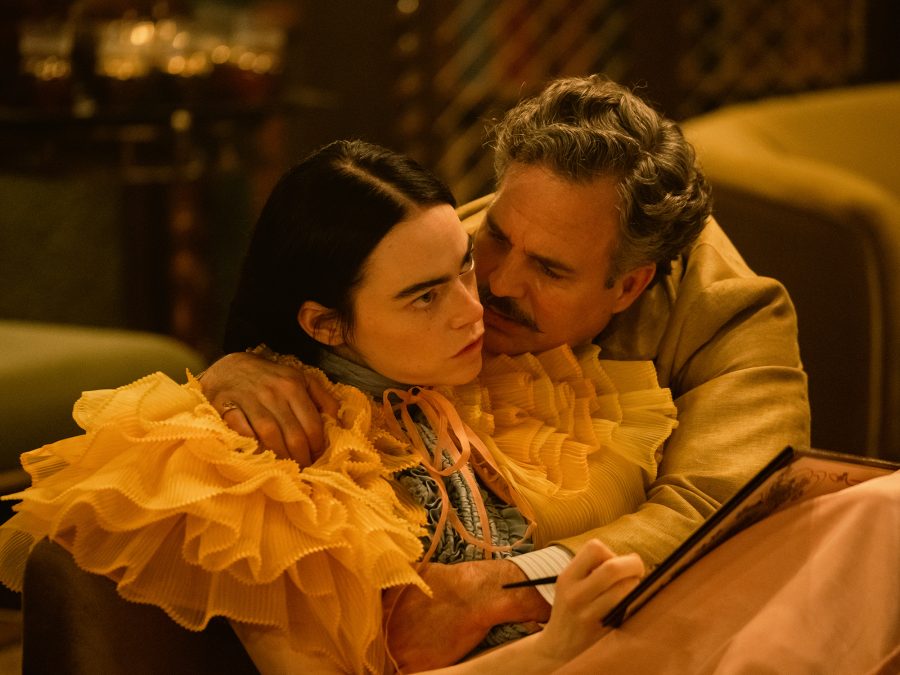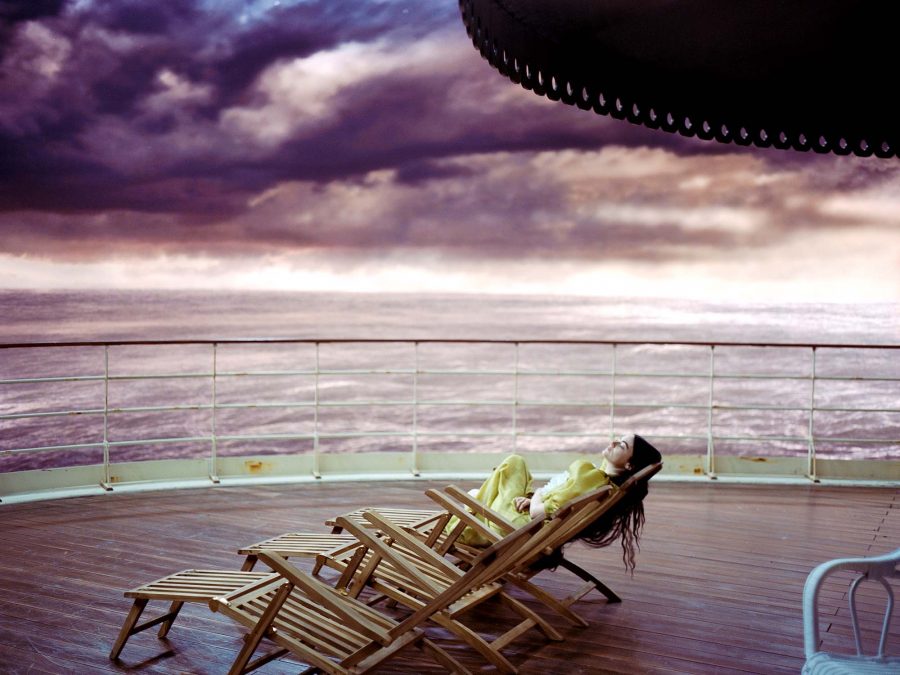Tower Bridge. The chime of a bell. We see the back of a brunette woman’s head against a leaden sky, her hair tightly tucked in a bun. Then, her cobalt blue gown flaps in the wind as she flings herself off the bridge. In the opening of Yorgos Lanthimos’ sensational eighth feature, Poor Things, one woman falls into the film’s rich, icy colour scheme, while another one emerges in black and white. That curious person is then seen drumming a few piano keys with her long hair getting in the way. She has little in common with the elegant (but suicidal) lady from before; yet they are one and the same.
Bella Baxter (Emma Stone) is learning to walk and talk in the body of a twenty-something woman while under careful supervision. She is banned from leaving her opulent premises. Dr. Godwin Baxter, who is fondly, symbolically referred to as “God” (Willem Dafoe), oversees her development under the auspices of an “experiment” at his home. He enlists a medical student named Max McCandles (Ramy Youssef) to keep daily track of her expanding word usage and (frankly bizarre) nutritional intake. As they’re all kept cloistered in the Baxter house (Dogtooth, anyone?), it doesn’t take long for the agreeable Max to fall for Bella, whose unfiltered baby speak stands at odds with her alluring feminine physique.
In the spirit of its woman-child protagonist, Lanthimos’ film is a hybrid which betters itself at an accelerating pace: between gothic sensibility and fierce comedy; black-and-white and resplendent colour. It amalgamates notions of desire and death drive into a single, most curious whole.
Poor Things is adapted from Scottish writer Alasdair Gray’s 1992 novel of the same name, which presents a Victorian tangle of gothic motifs and fanciful medical innovations. The book is fittingly outlandish, with illustrations by the author and a visual and stylistic map tracking its female protagonist’s development. Gray and Lanthimos are a perfect match, and no wonder the book has not been turned into a film before; it’s now found its second maker. The screenplay he entrusts to co-writer Tony McNamara (The Favourite) and their collaboration does so much to enrich the world of the novel in a confident retelling that focuses first and foremost on Bella.
For his first, more direct novel adaptation – after drawing on mythology and historical sources in his previous two films – the Greek director spares no scintilla of conceptual and creative flair. In addition to swapping Glasgow for London as the story’s initial backdrop, the film opens up like a pop-up book depicting Bella’s ever-changing world. Although, her exploration can only begin when she’s matured enough to fight for her right to live a little before marrying Max. From London, she sets sail to Lisbon, then Alexandria, and finally Paris for a voyage of moral, intellectual and sexual discovery.

In the beginning, everything is filmed in luscious black-and-white, which translates as a visual mirror of Bella’s non-discriminating, binary gaze; the more she knows, the more colourful her world becomes. World-building through colour sounds deceitfully simple, since the hues and shades warm up scene by scene, but the transition from monochrome to succulent yellows and reds must be harsh in order to mark the evolutionary jump.
In this way, a fantastic atemporality glosses over the sense of linear time and place, dislocating the viewer’s expectations of period-true architecture. Lisbon’s trams, for example, now dangle from the skies. Bella’s world is constantly expanding. From the moment she discovers maps to her demands to see the outside world, the film’s aesthetics mimic that sense of an originary exploration. Robbie Ryan’s plastic cinematography shows us how life seems to her, with warped fisheye, ravenous zooms, and all.
Bella’s evolution is a wonder to behold thanks to how pliable Emma Stone’s performance is. Guided by Birmingham-born artist Jerskin Fendrix’s minimal, but reverberating compositions of singular string strokes or piano key taps, Bella’s transformation shows her learning how to navigate a body and the growing expansion of known spaces at the same time.
She consumes the world step by awkward step, until it becomes truly hers. In a way, the American actress is tasked to cultivate an identity as it forms, without posturing and with naturalism made impossible. Bella stumbles and botches the English syntax at first, but she forms a genuine connection with a life outside convention. The better she learns to speak, the more control she exerts. Soon, she begins to narrate feelings and emotion as they occur in a corporeal diary, which serve to point out the latent contradictions in a largely misogynistic world. To a woman growing up outside patriarchy, but in the vicinity of it, all its trappings seem absurd, its logic unfounded.
Poor Things digs into the comedy of these conventions as if it was a gold mine. Because of how it treats the pillars of heteronormative society as inherited from the Victorian era, the film delights in being a farcical feminist rendition of three crucial -isms of the Enlightenment: rationalism, the mind-body dualism, and progressivism. Bella counters them all through the most radical means in such a sanitised intellectual context: sex.

Her autonomy is realised through language and orgasms, and in her case, they go hand in hand. When Bella decides to leave the confines of Baxter’s home, she knows all too well what to expect from a debaucherous trip with famed seducer Duncan Wedderburn (Mark Ruffalo, who oscillates between ruinous to gloriously sullen). For her, sex is a morally neutral act and pleasure a key for a good life. Jealousy and monogamy are nonsensical concepts she cannot name, and the fantasmatic iterations of what she calls “furious jumping” (has there ever been a phrase more accurate?) she and Duncan engage in, exemplify how her fresh perspective descales heterosexual relationships out of their pernicious moralism. By making her desires known, heard, and fulfilled, Bella slips into a dominating role quite easily because she hasn’t been taught subjugation – a hope for women of the future, unburdened.
Subversively, Bella’s knowledge is carnal, and this is perhaps why the film is so easily labelled feminist. Yet, Lanthimos’ films have rarely seen bodies as more than sacks of flesh, a necessity for structures to perpetuate their power:be it Dogtooth’s family, The Lobster’s heteronormativity, or The Favourite’s royal court. But after Queen Anne, her limping and her gout in the last film, comes the expansive Bella Baxter, her climaxing face tightly held in close up again and again throughout Poor Things. Perhaps she’s immune to patriarchy because the same electrical currents that were used back then to “cure” women of hysteria (aka the medically enforced veto on female sexuality) brought her back to life.
We’ve knelt quietly at the altar of Yorgos for five long years waiting for new work, and boy, our prayers surely have been answered with a film as marvellously complex as this one. Already a Golden Lion winner, Poor Things showcases the director at his most playful and comedic, weaving his otherwise evident political critique into the complex character of Bella: a new kind of woman, a tabula rasa. How pleasurable it is to witness an evolution like Bella’s, with wonder and admiration.
This miraculous film daubs punkish splotches of surreal absurdity over the canvas of the traditional period film. Lanthimos’ distrust of power structures here targets the patriarchy, and Stone is the bravest soldier, as both producer and lead actress. “If I know the world, I can improve it,” is Bella’s credo, and that is probably the most optimistic thing a character in a Lanthimos film has ever said, ‘Oh, to be a poor thing must be life’s greatest joy!’
Little White Lies is committed to championing great movies and the talented people who make them.
ANTICIPATION.
We haven’t been as excited for something since the maid arrived with something called a pineapple. 5
ENJOYMENT.
Emma Stone slaying, Mark Ruffalo simping, Willem Dafoe burping, and countless more joys to experience. 5
IN RETROSPECT.
I now sexually identify as a Bella Baxter. 5
Directed by
Yorgos Lanthimos
Starring
Emma Stone, Willem Dafoe, Mark Ruffalo
The post Poor Things review – Lanthimos at his most playful and comedic appeared first on Little White Lies.
from Little White Lies https://ift.tt/Di75u4K
via IFTTT

0 Comments